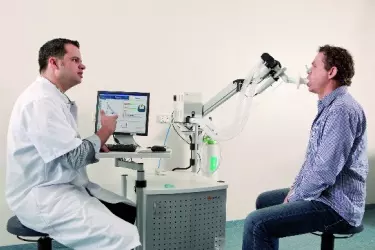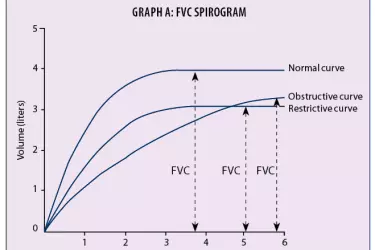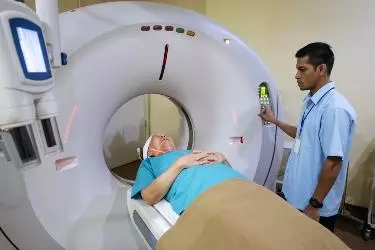
Pulmonary function test (PFT) is a noninvasive diagnostic test that provide measurable feedback about the function of the lungs. The set of tests performed under this segment assesses the lung volumes, capacities, rates of flow, and gas exchange which can help in the diagnosis of certain lung disorders.
All smokers should get their lungs checked atleast once a year but anyone breathing the polluted Delhi or NCR air should also get their Pulmonary Function Test ( PFT ) done. Every health checkup should also include PFT test as standard. Those having a family history of Chronic Obstructive Pulmonary Disorder ( COPD ) should also get the PFT test done regularly.
The capacity of the lungs to intake air when we breathe is called the Lung Capacity. When you are running, climbing stairs or doing any other strenuous activity then the cells of the body require more sugar and more oxygen which can be given by the lungs if they can take more air. If the lung capacity is reduced then the person would not be able to do strenuous work and would start puffing in a little while.

There are many different reasons why PFTs may be ordered. They are sometimes ordered in healthy individuals as part of a routine physical. In others, the tests may be ordered when a specific illness is suspected. Some of the disorders that may be detected with PFTs include:
![]() Allergies - An acquired, abnormal immune response to one or more substances that can cause a broad range of inflammatory reactions.
Allergies - An acquired, abnormal immune response to one or more substances that can cause a broad range of inflammatory reactions.
![]() Chronic lung conditions - Conditions, such as asthma, bronchiectasis, emphysema, and chronic bronchitis, that can be treated but not cured.
Chronic lung conditions - Conditions, such as asthma, bronchiectasis, emphysema, and chronic bronchitis, that can be treated but not cured.
![]() Asbestosis - A lung disease caused by the inhalation of asbestos fibers.
Asbestosis - A lung disease caused by the inhalation of asbestos fibers.
![]() Chest trauma - Trauma to the chest, such as fractured ribs or a recent surgical procedure, can restrict an individualís ability to breathe adequately
Chest trauma - Trauma to the chest, such as fractured ribs or a recent surgical procedure, can restrict an individualís ability to breathe adequately
![]() Restrictive airway conditions - Impaired lung expansion as a result of conditions, such as scoliosis, pulmonary tumors, or inflammation or scarring of the chest wall.
Restrictive airway conditions - Impaired lung expansion as a result of conditions, such as scoliosis, pulmonary tumors, or inflammation or scarring of the chest wall.
![]() Sarcoidosis - A condition that causes small, fleshy swellings in the tissue around the organs, usually in the liver, lungs, and spleen.
Sarcoidosis - A condition that causes small, fleshy swellings in the tissue around the organs, usually in the liver, lungs, and spleen.
![]() Scleroderma - A disease of the bodyís connective tissue that causes thickening and hardening of the skin.
Scleroderma - A disease of the bodyís connective tissue that causes thickening and hardening of the skin.

In the PFT Test you are supposed to blow into a small mouthpiece and the pressure of the air blown by you is measured in the computer which is then analyzed by a lung specialist to see whether your lungs are performing normally or not. Other tests for finding the health of the lungs is X-Ray of the Chest which gives vital information about the condition of the lungs. Diseases like Tuberculosis, Pneumonia etc are diagnosed on X-Ray. However High Resolution Lung CT is the gold standard for getting complete information about the Lungs. Even small nodules are picked up on CT Scan which is then analyzed by Radiologists to diagnose Lung Cancer.
Further study of the Lungs is then carried out through Bronchoscopy. In flexible bronchoscopy, a doctor inserts a thin bendable tube through the mouth or nose into the lungs. A light and a small camera on the bronchoscope allows the doctor to look inside the lungs' airways.
One of the most common question asked by my patients is whether to go for jogging or brisk walk. Please watch this video where I have tried to explain all the aspects of jogging and running depending upon various conditions and scenario.
In this video Dr Balvin has explained about causes of infertility and how IVF has come as boon for such people. There are different reasons that lead to infertility so treatment depends upon the specific reason. Watch the vide to understand.